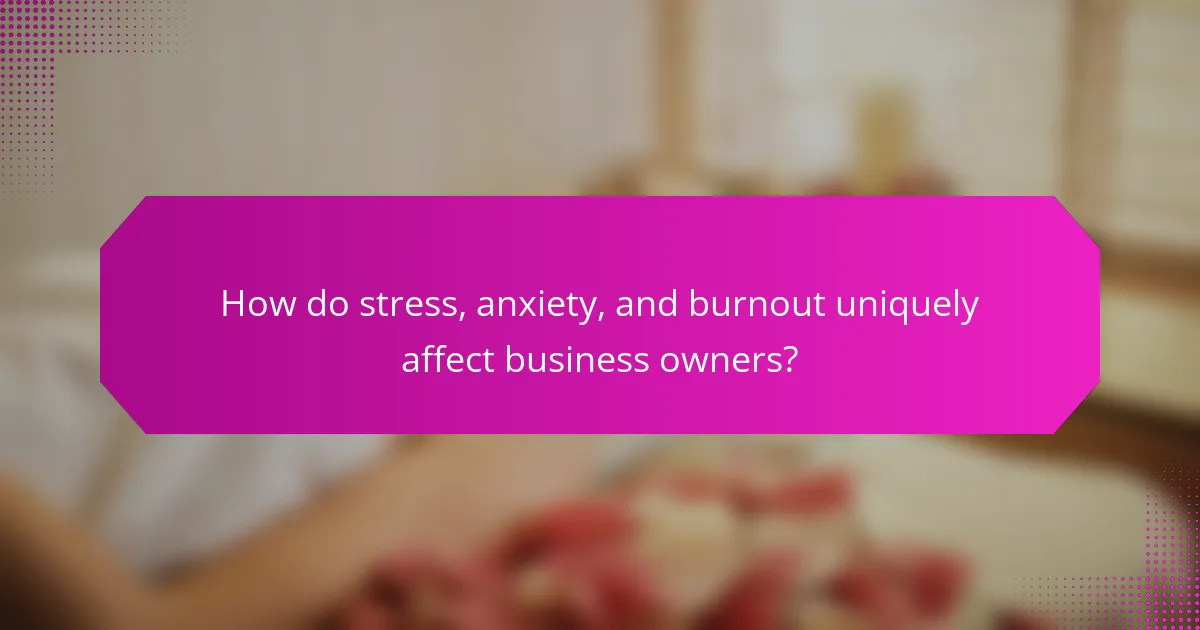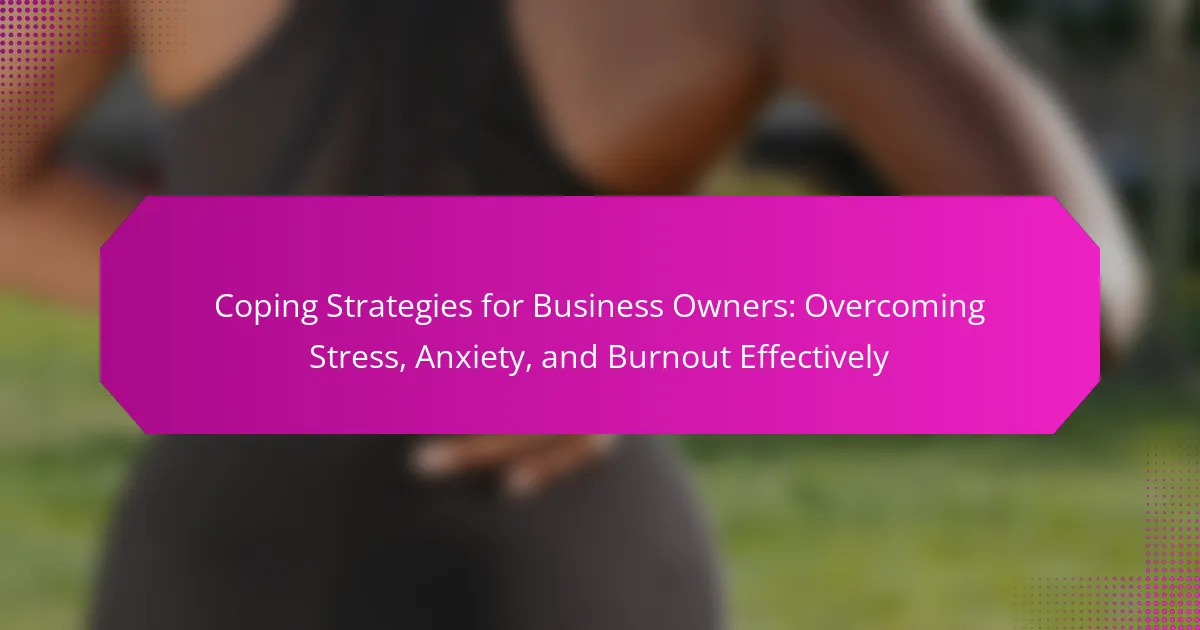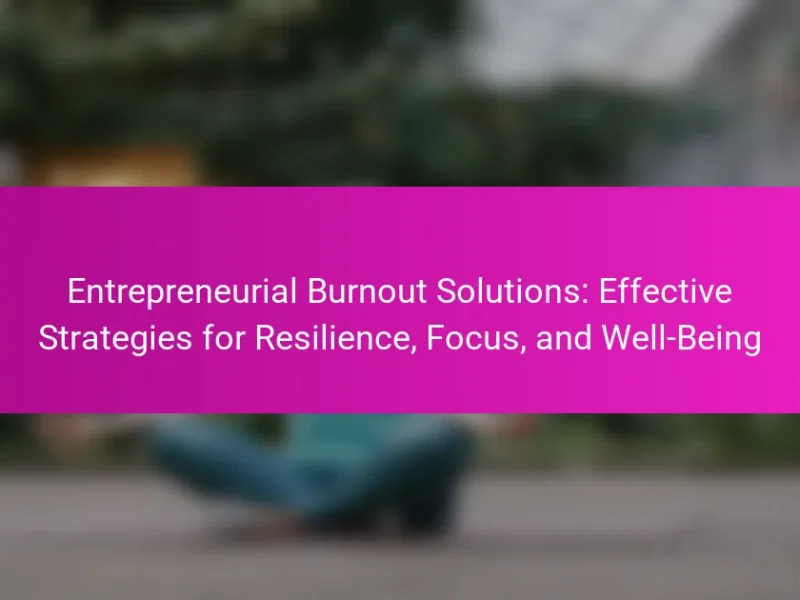Business owners often face significant stress, anxiety, and burnout, impacting their decision-making and productivity. Effective coping strategies include establishing work-life boundaries, practicing mindfulness, and seeking peer support. Implementing structured routines and prioritising physical health can enhance resilience. Recognising mental health signs is crucial for proactive recovery and maintaining well-being.

How do stress, anxiety, and burnout uniquely affect business owners?
Stress, anxiety, and burnout uniquely impact business owners by affecting their decision-making, productivity, and overall well-being. These conditions can lead to decreased motivation and increased feelings of isolation. Business owners often face relentless pressures, making it challenging to prioritise self-care.
To cope effectively, owners should establish boundaries between work and personal life. Regular breaks can enhance mental clarity and reduce fatigue. Seeking support from peers or mental health professionals can provide valuable perspectives and coping techniques.
Implementing structured routines promotes stability and helps manage stress levels. Mindfulness practices, such as meditation or yoga, can improve emotional resilience. Prioritising physical health through exercise and proper nutrition also plays a crucial role in combating these challenges.
Ultimately, recognising the signs of stress, anxiety, and burnout is essential for business owners to take proactive steps toward recovery and maintain a sustainable work-life balance.
What are the common symptoms of stress and anxiety in entrepreneurs?
Common symptoms of stress and anxiety in entrepreneurs include fatigue, irritability, difficulty concentrating, and sleep disturbances. These symptoms can lead to burnout if not addressed. Entrepreneurs may also experience physical symptoms such as headaches, muscle tension, and gastrointestinal issues. Recognising these signs early is crucial for implementing effective coping strategies.
How does burnout manifest differently for business owners?
Burnout manifests differently for business owners through unique stressors such as financial pressures, decision-making responsibilities, and employee management. These factors intensify feelings of isolation and overwhelm. Business owners often experience burnout as a loss of passion for their work, decreased productivity, and emotional exhaustion. Recognising these signs early is crucial for implementing effective coping strategies tailored to their specific challenges.

What universal coping strategies can entrepreneurs adopt?
Entrepreneurs can adopt universal coping strategies like mindfulness, time management, and social support to effectively overcome stress, anxiety, and burnout. Mindfulness practices enhance emotional regulation and reduce stress levels. Effective time management allows entrepreneurs to prioritise tasks, minimising overwhelm. Building a strong support network fosters resilience and provides necessary encouragement during challenging times. These strategies help maintain mental well-being and improve overall productivity.
How can time management improve mental health?
Effective time management significantly enhances mental health by reducing stress and preventing burnout. By prioritising tasks and setting realistic goals, business owners can create a structured environment that fosters productivity. This approach minimises feelings of overwhelm, allowing for better focus and clarity. Moreover, allocating time for breaks and self-care activities can rejuvenate the mind, leading to improved emotional resilience. As a result, business owners experience lower anxiety levels and a more balanced work-life dynamic.
What are effective prioritisation techniques?
Effective prioritisation techniques include the Eisenhower Matrix, ABCD prioritisation, and time blocking. These methods help business owners manage tasks and reduce stress.
The Eisenhower Matrix categorises tasks into four quadrants based on urgency and importance, guiding decision-making. ABCD prioritisation assigns letters to tasks, with A being the highest priority. Time blocking involves scheduling specific periods for focused work on tasks, enhancing productivity.
Implementing these techniques can significantly alleviate anxiety and burnout by providing clarity and structure in task management.
What role does physical health play in managing stress?
Physical health significantly influences stress management for business owners. Regular exercise, balanced nutrition, and adequate sleep enhance resilience against stressors. Engaging in physical activity releases endorphins, which improve mood and reduce anxiety. Moreover, maintaining a healthy lifestyle fosters better decision-making and productivity. Prioritising physical health can thus serve as a unique coping strategy, enabling business owners to navigate challenges more effectively.
Which exercises are best for reducing anxiety?
Exercise can significantly reduce anxiety for business owners. Effective options include aerobic activities, yoga, strength training, and mindfulness exercises.
Aerobic activities like running or cycling release endorphins, promoting a sense of well-being. Yoga combines physical movement with breath control, enhancing relaxation. Strength training can improve self-esteem and resilience. Mindfulness exercises, such as meditation or deep breathing, help centre thoughts and reduce stress.
Incorporating these exercises into a routine can lead to long-term anxiety management. Aim for at least 30 minutes of physical activity most days for optimal benefits.

What unique coping mechanisms are specific to business owners?
Business owners often employ unique coping mechanisms to manage stress, anxiety, and burnout. These strategies include time management techniques, mindfulness practices, and networking for support.
Time management allows business owners to prioritise tasks effectively, reducing feelings of overwhelm. Mindfulness practices, such as meditation or deep breathing exercises, help maintain focus and emotional balance. Networking provides a support system, enabling owners to share experiences and solutions with peers facing similar challenges.
Additionally, setting boundaries between work and personal life is a unique attribute that significantly enhances well-being. These coping mechanisms empower business owners to navigate the pressures of entrepreneurship successfully.
How can networking provide emotional support?
Networking can provide emotional support by fostering connections that alleviate feelings of isolation. Engaging with peers allows business owners to share experiences, gaining insights that validate their challenges. This shared understanding can significantly reduce stress and anxiety, creating a sense of community. Emotional support through networking can also enhance resilience, providing encouragement during tough times. Ultimately, these relationships contribute to a healthier mindset, promoting overall well-being and preventing burnout.
What is the significance of mentorship in stress management?
Mentorship plays a crucial role in stress management for business owners by providing guidance and support. Mentors help identify coping strategies tailored to individual challenges. They offer valuable insights on managing anxiety and preventing burnout, fostering resilience. Studies show that mentorship can significantly reduce stress levels, enhancing both personal and professional well-being. Engaging with a mentor cultivates a supportive network, which is vital for navigating the pressures of entrepreneurship.

What are the rare but effective strategies for overcoming mental health challenges?
To overcome mental health challenges, business owners can utilise rare but effective strategies like mindfulness retreats, nature immersion, and peer support groups. These approaches foster resilience and promote well-being. Mindfulness retreats help reduce stress by enhancing focus and awareness. Nature immersion, such as spending time outdoors, has been shown to lower anxiety levels. Additionally, peer support groups provide a safe space for sharing experiences and gaining insights from others facing similar challenges. Implementing these strategies can lead to significant improvements in mental health.
How can creative outlets serve as a coping strategy?
Creative outlets can effectively serve as coping strategies for business owners by providing a means to express emotions and relieve stress. Engaging in activities such as painting, writing, or music can enhance mental well-being and foster resilience. These creative practices allow for emotional release, reducing anxiety and preventing burnout. Furthermore, studies indicate that artistic expression can lead to improved problem-solving skills, which is crucial for managing business challenges. Thus, integrating creative outlets into daily routines can significantly improve overall mental health and productivity.
What unconventional practices have proven beneficial?
Unconventional practices such as mindfulness meditation, nature immersion, and creative expression have proven beneficial for business owners facing stress and burnout. Mindfulness meditation enhances focus and emotional resilience. Nature immersion reduces anxiety and improves mood. Creative expression fosters problem-solving and innovation. These strategies offer unique attributes that promote mental well-being and productivity.

What expert insights can guide business owners in managing mental health?
Business owners can manage mental health by implementing effective coping strategies. Prioritising self-care, establishing boundaries, and seeking professional support are essential steps.
Regular physical activity reduces stress and improves mood. Mindfulness practices, such as meditation, enhance emotional resilience. Building a supportive network fosters connection and reduces feelings of isolation.
Time management techniques can alleviate overwhelm, allowing for a balanced workload. Setting realistic goals prevents burnout and promotes a sense of achievement.
Lastly, recognising the signs of mental health struggles is crucial. Early intervention can lead to better outcomes and sustained well-being.
What are the best practices for maintaining a healthy work-life balance?
To maintain a healthy work-life balance, business owners should prioritise self-care, set boundaries, and delegate tasks. Implementing regular breaks can reduce stress and enhance productivity. Establishing a structured schedule helps in managing time effectively. Engaging in physical activities and hobbies promotes mental well-being. Seeking support from peers or professionals can also provide valuable coping strategies.
What common mistakes should entrepreneurs avoid in their coping strategies?
Entrepreneurs should avoid common mistakes like neglecting self-care, failing to seek support, and ignoring warning signs of stress. Prioritising mental health is crucial for effective coping strategies. Overworking without breaks leads to burnout, while isolation can exacerbate anxiety. Acknowledging these pitfalls enhances resilience.
How can business owners optimise their mental health for long-term success?
Business owners can optimise their mental health by implementing effective coping strategies. Prioritising self-care, setting boundaries, and seeking support are crucial steps.
Establishing a routine that includes physical activity, mindfulness practices, and adequate rest can significantly reduce stress levels. Engaging in regular exercise has been shown to improve mood and decrease anxiety.
Creating a supportive network is essential. Connecting with other entrepreneurs can foster a sense of community and shared experience, reducing feelings of isolation.
Finally, recognising the signs of burnout early allows for timely intervention. Implementing breaks and seeking professional help when needed can prevent long-term mental health issues.


